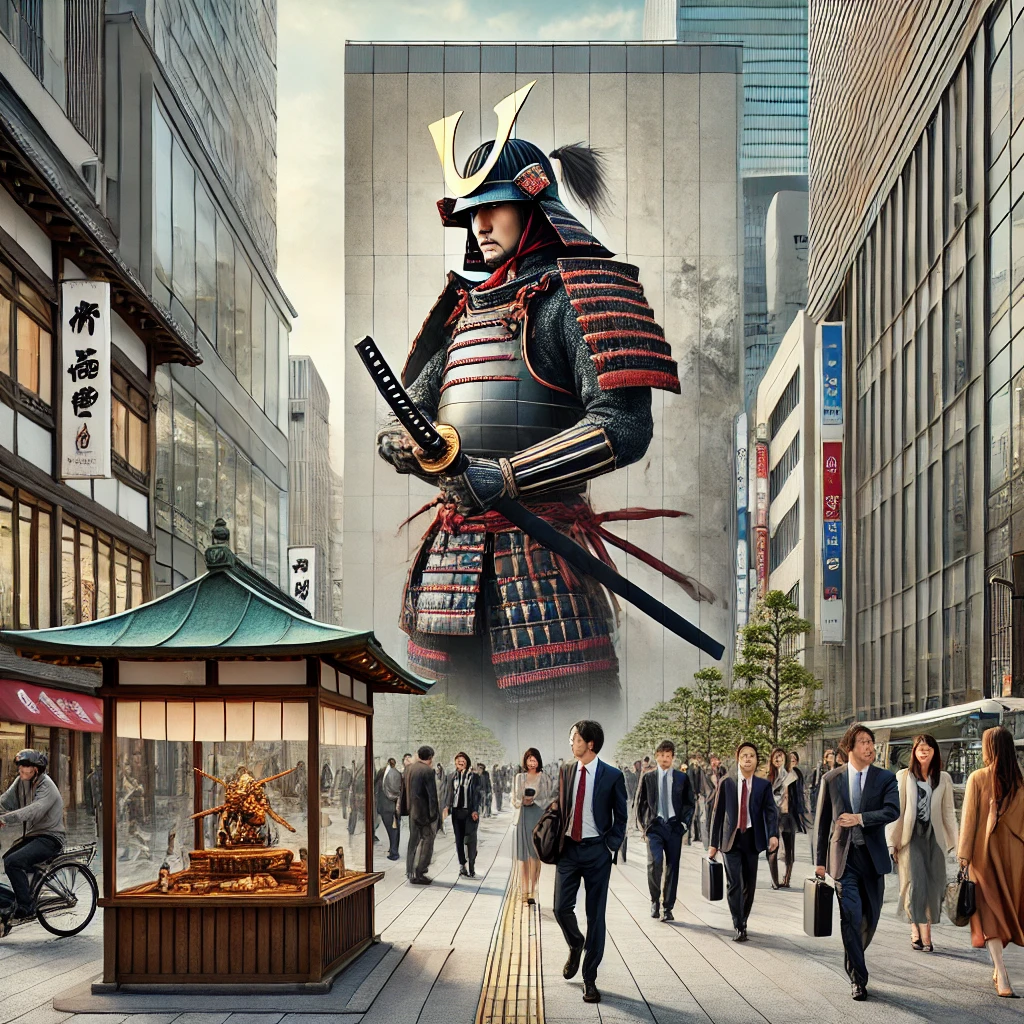Table of Contents
Introduction to Samurai Culture
Samurai culture represents a profound aspect of Japan’s historical narrative, characterized by its intricate blend of martial prowess and philosophical depth. Emerging during the Heian period (794-1185), the samurai became the ruling military class, fundamentally influencing Japan’s feudal system and social hierarchy. These warriors served not only as military leaders but also as administrators and caretakers of the land, embodying the principles of loyalty and honor that defined their existence. The samurai adhered to a strict ethical code known as ‘Bushido,’ which emphasized virtues such as courage, integrity, and respect. This code governed not only their conduct in battle but also their interactions within society, thus framing the cultural fabric of Japan during the feudal era.
The historical significance of samurai culture extends beyond the battlefield; it has permeated Japanese arts, literature, and spiritual beliefs. The samurai’s commitment to self-discipline is reflected in various forms of traditional art, such as the practice of Zen Buddhism, calligraphy, and the tea ceremony, which all echo the values intrinsic to the samurai ethos. Furthermore, with the introduction of firearms in the late 16th century, the role of the samurai evolved, leading to the rise of strategic military tactics and a shift in their societal functions. Despite these changes, the underlying ideals of honor and loyalty continued to characterize the samurai’s identity.
Today, the legacy of samurai culture persists in modern Japan, influencing everything from contemporary business practices to popular media and entertainment. The values upheld by the samurai remain relevant, contributing to a collective cultural identity that prioritizes respect, discipline, and duty. Through festivals, literature, and film, the stories of these esteemed warriors keep the spirit of samurai culture alive, inspiring new generations to appreciate their profound impact on Japan’s historical development and cultural continuity.

The Bushido Code: Principles and Values
The Bushido code, often regarded as the ethical backbone of samurai culture, comprises a set of values that have profoundly shaped not only the lives of samurai but also contemporary Japanese society. At its core, the code emphasizes principles such as loyalty, honor, courage, and respect, which have transcended the feudal era and continue to resonate in various aspects of modern life in Japan.
Loyalty, one of the central tenets of Bushido, epitomizes the commitment that samurai warriors exhibited towards their lords. This virtue remains significant in contemporary Japanese corporate culture, where employees are often expected to display a high degree of allegiance to their companies. The expectation of loyalty fosters a surrounding atmosphere of trust, essential for effective teamwork and organizational stability. In the face of challenges, this dedication guides individuals to prioritize collective goals over personal interests, echoing the samurai’s feudal obligations.
Honor, another pillar of Bushido, underlies the importance placed on reputation and integrity. In today’s society, personal honor translates to maintaining one’s credibility and fulfilling responsibilities, both in personal and professional realms. Such values are evident in the emphasis on ethical conduct in business transactions, reinforcing the idea that one’s actions reflect not only on the individual but also on their community.
Courage is another fundamental aspect of the Bushido philosophy. This principle encourages individuals in modern Japan to confront challenges head-on, whether they be in their careers or personal lives. The endurance and resilience cultivated through this ethical framework empower individuals to pursue their aspirations despite obstacles, thereby fostering a culture of innovation and determination.
Incorporating these principles from the Bushido code into modern practices illustrates the enduring legacy of samurai culture in Japan. By valuing loyalty, honor, and courage, many facets of Japanese life, from corporate governance to personal relationships, continue to be influenced by these ancient ideals.
Samurai Influence in Japanese Arts and Literature
The legacy of samurai culture permeates various facets of Japanese arts and literature, reflecting the values, aesthetics, and philosophies of this storied class. Traditional art forms, particularly ukiyo-e woodblock prints, often showcased samurai as both noble warriors and subjects of romanticized lore. Artists like Katsushika Hokusai and Utagawa Hiroshige captured the beauty and discipline inherent in samurai life, illustrating their profound connection to nature and their duty to honor and loyalty. These woodblock prints not only served as visual expressions but also played a crucial role in shaping public perception of samurai ideals across Japan and beyond.
Similarly, the influence of samurai culture extends into the realm of literature. Classic text and contemporary novels alike often encapsulate themes related to honor, personal sacrifice, and the code of conduct known as bushido. Authors such as Yukio Mishima have drawn upon samurai ethos to explore the complexities of the human condition, presenting characters who grapple with the intertwining of duty and personal desires. The samurai’s moral dilemmas resonate in narratives that span various genres, illustrating how the historical figure of the samurai continues to serve as a metaphor for struggle and integrity in modern storytelling.
The performing arts are no exception to this rich tradition. Noh theatre, one of Japan’s oldest theatrical forms, incorporates themes from samurai tales, emphasizing the interplay of emotions, spirituality, and existential dilemmas. The use of distinctive masks and gestures in Noh performances reflects the samurai’s inner conflicts and ideals, allowing audiences to connect deeply with the stories being portrayed. Additionally, modern cinema frequently reinterprets samurai figures, illustrating their enduring allure and the fascination with their ethical codes, as seen in films by directors like Akira Kurosawa.
Through these artistic expressions, the samurai ethos is preserved, allowing new generations to engage with and understand the ideals that shaped Japanese culture and society.
Martial Arts: A Legacy of Samurai Training
Martial arts in Japan represent a profound legacy rooted deeply in the training practices of the samurai. Originally developed as combat skills for warriors, these martial disciplines have evolved significantly over the centuries while preserving the core values of discipline, respect, and honor integral to the samurai ethos. The term “budo,” which encompasses the martial arts of Japan, captures the philosophical underpinnings of these practices, focusing not just on physical techniques but also on character development.
Among the most prominent martial arts that trace their lineage to samurai training is Kendo, the “way of the sword.” Practitioners, known as kendoka, engage in full-contact sparring with bamboo swords called “shinai,” wearing protective armor. This sport emphasizes discipline, strategy, and respect—qualities that were paramount in the lives of the samurai. Kendo training serves not only as a means of developing physical prowess but also as a vehicle for cultivating精神 (seishin), or spiritual strength, reflecting the samurai’s holistic approach to mastery and self-improvement.
Another significant martial art is Aikido, developed in the early 20th century by Morihei Ueshiba. Aikido principles are heavily influenced by the philosophy and techniques of the samurai, emphasizing the importance of harmony and non-violence. It teaches practitioners to blend with an opponent’s movements, redirecting their energy rather than confronting them head-on. This approach mirrors the samurai’s strategic mindset, where the goal is to resolve conflict with minimal force and maximum efficiency, reinforcing the samurai’s philosophical commitment to peace and balance.
Overall, the impact of samurai culture on modern martial arts in Japan is undeniable. These practices continue to be an essential part of Japanese identity, fostering a connection to history and cultivating qualities that resonate beyond the dojo. Today’s practitioners carry forward the legacy of the samurai, ensuring that their values of discipline, respect, and harmony endure in contemporary society.
The Aesthetic of Minimalism and Nature
The samurai culture in Japan, steeped in rich history and philosophy, has had a profound influence on contemporary Japanese aesthetics, particularly in its relationship with nature. Central to this influence is the samurai’s profound appreciation for the natural world, which manifests vividly in various aspects of modern Japanese life, from architecture to garden design and product aesthetics. This relationship arises from a deep-seated belief in harmony, simplicity, and the transient beauty of nature, echoing through the ages.
One of the most significant aspects of this aesthetic is minimalism, which has become a defining characteristic of modern Japanese architecture. The samurai ethos, closely tied to Zen Buddhism, emphasizes the beauty found in simplicity and the importance of creating tranquil spaces that encourage reflection and mindfulness. Contemporary Japanese buildings often reflect this philosophy, characterized by clean lines, open spaces, and the use of natural materials, all designed to foster a sense of calm and connection to the environment.
Additionally, traditional Japanese gardens, influenced by samurai ideals, exemplify the seamless integration of nature and human design. These gardens prioritize simplicity and the intentional arrangement of elements to create a peaceful retreat. Features such as rock formations, water, and carefully placed plants resonate with the samurai’s reverence for nature and symbolize their belief in the cycle of life and death. In the modern context, these design principles extend beyond gardens to include landscape architecture and urban planning, reinforcing a commitment to environmental harmony.
Moreover, product design in Japan often mirrors the samurai philosophy, which values functionality coupled with aesthetic appeal. This philosophy underscores the importance of craftsmanship and attention to detail — principles that resonate in today’s modern design ethos. Ultimately, the lasting influence of samurai culture on contemporary aesthetics serves as a reminder of the enduring relationship between humans and nature.
Civic Duty and Community Values
The impact of samurai culture on modern Japanese society extends significantly into the realms of civic duty and community values. Historically, samurai were not only warriors but also integral members of their communities, often engaging in practices that emphasized loyalty, honor, and social responsibility. These principles have permeated contemporary Japanese culture, fostering a strong sense of duty among citizens.
Today, the influence of samurai values is evident in the Japanese commitment to communal well-being and social harmony. Civic duty in Japan manifests through various avenues, including volunteerism and active participation in community initiatives. The spirit of collaboration, akin to the camaraderie found among samurai, encourages individuals to contribute selflessly to societal needs. This reflects a deep-seated belief that personal efforts enhance the collective welfare of the community.
Moreover, modern Japan showcases continued respect for traditions that promote communal values. Many citizens engage in local festivals, charity events, and neighborhood clean-ups, echoing the samurai ethos of serving a greater cause. Such practices foster a sense of belonging and reinforce the principles rooted in samurai heritage. Additionally, educational institutions often integrate lessons on responsibility, teamwork, and respect for others, further embedding these values in the younger generation.
The dedication to maintaining social harmony in Japan can also be traced back to the teachings of samurai, who prioritized peace within their domains. In the present day, the emphasis on consensus and cooperation remains crucial in both personal and professional contexts. Thus, the legacy of samurai culture continues to shape modern concepts of civic duty and community-oriented values in Japan, illustrating how historical influences can persist through time.
Media Representation of Samurai Culture Today
In contemporary media, the portrayal of samurai culture is significant and multifaceted, featuring prominently across various forms including movies, anime, and video games. These representations have evolved over the years, manifesting in both romanticized and more authentic interpretations of the samurai. The romanticized version often celebrates the samurai as honorable warriors, emphasizing values such as loyalty, bravery, and bushido, the way of the warrior. This narrative tends to amplify the mystique surrounding samurai culture, creating a heroic image that captivates audiences both within and outside of Japan.
Films like “The Last Samurai” and Akira Kurosawa’s “Seven Samurai” serve as hallmark examples, blending historical events with fictional elements to encapsulate the samurai ethos. These narratives contribute to a collective perception of samurai culture as noble and majestic, often glossing over the complexities and harsh realities faced by these warriors. This tendency toward romanticism can lead to a skewed understanding of Japan’s past, fostering an image that is more myth than fact.
On the other hand, contemporary anime and video games frequently challenge these ideals by portraying more nuanced representations of the samurai. Series such as “Samurai Champloo” and video games like “Ghost of Tsushima” juxtapose traditional samurai values with modern challenges, offering a critical lens through which viewers can examine the contradictions inherent in samurai culture. Such works strive for authenticity, often highlighting the internal struggles and moral dilemmas faced by samurai characters. This balanced approach not only enlightens audiences but also enriches Japan’s cultural identity in the global arena. Consequently, the media representation of samurai culture continues to evolve, reflecting both the historical legacy and the modern societal values of Japan.
Tourism and Cultural Heritage
The lasting influence of samurai culture extends far beyond historical narratives; it plays a significant role in Japan’s contemporary tourism landscape. Numerous historical sites, museums, and vibrant festivals dedicated to samurai heritage not only attract local visitors but also draw international tourists eager to explore this iconic aspect of Japanese culture. From the ancient castles where samurai once resided to memorial sites commemorating their legendary battles, these locations serve as portals to Japan’s illustrious past.
One of the prime examples of a historical site promoting this cultural heritage is Himeji Castle, often referred to as the “White Heron Castle” due to its stunning white exterior. This UNESCO World Heritage site exemplifies the architectural brilliance of the samurai era and is a focal point for tourists interested in Japan’s feudal history. Similarly, the samurai districts in Kanazawa and Takayama have maintained their traditional charm, featuring well-preserved buildings and streets that transport visitors back to the age of the samurai.
Museums dedicated to samurai artifacts, such as swords, armor, and scrolls, serve to educate visitors regarding the daily lives and values of these warriors. The Samurai and Ninja Museum with Experience in Kyoto, for instance, not only showcases historical items but also allows guests to engage in hands-on experiences such as wearing traditional armor or learning sword techniques, enhancing their immersion in this cultural phenomenon.
Additionally, festivals celebrating samurai culture, including parades and reenactments, provide dynamic experiences for tourists. Events like the Takayama Festival feature elaborate floats and performances reminiscent of the samurai’s honor and martial prowess, fostering appreciation and interest in Japan’s cultural heritage. Collectively, these attractions highlight the profound significance of samurai culture in promoting tourism, making it a vital element of Japan’s cultural identity and economic vitality.
Conclusion: The Enduring Legacy of Samurai Culture
The impact of samurai culture on modern Japan is both profound and multifaceted, manifesting across various dimensions of contemporary society. This legacy can be observed in the ethos and values that permeate everyday life in Japan, such as loyalty, honor, and discipline—principles that were central to the samurai code of conduct, known as bushido. These values continue to inform interpersonal relationships, business practices, and even national identity, emphasizing the importance of duty and respect.
Moreover, samurai culture has significantly influenced modern arts and media in Japan. Traditional forms of art, literature, and theater often draw inspiration from the samurai era, creating a rich tapestry of stories that celebrate the warrior spirit and the complexities of their lives. Contemporary films, television shows, and literature frequently explore samurai themes, reinforcing their relevance and appeal in today’s cultural landscape. This enduring fascination serves to not only entertain but also provoke reflection on ethical dilemmas and social responsibilities.

The samurai’s legacy is also evident in Japan’s martial arts, which are renowned worldwide. Practices such as kendo and iaido retain the techniques and philosophies rooted in samurai traditions, emphasizing discipline, respect, and rigorous training. These martial arts are not merely physical activities but embody a philosophical approach to life that resonates deeply with both practitioners and observers alike.
Understanding the lasting influence of samurai culture is vital for appreciating contemporary Japanese identity. It offers insight into the values that shape Japanese society, reflecting a collective memory that honors the past while navigating the challenges of modernity. Ultimately, the samurai legacy continues to enrich and guide Japan, imbuing the nation with a sense of continuity and purpose. This historical framework reveals why samurai culture remains a source of pride and inspiration for many, and underscores its significance in the narrative of modern Japan.






Some genuinely interesting info , well written and loosely user genial.